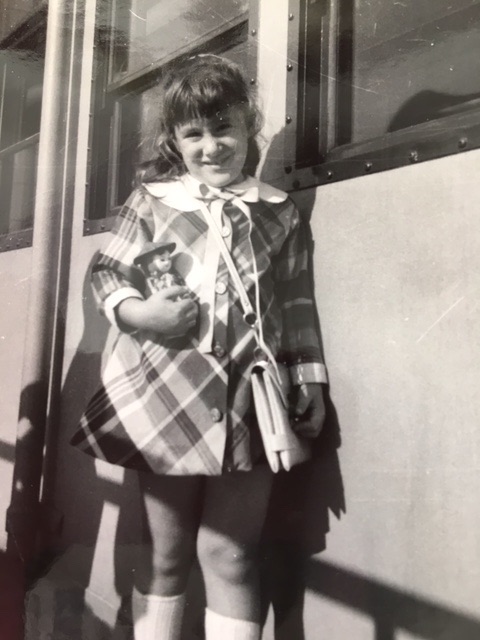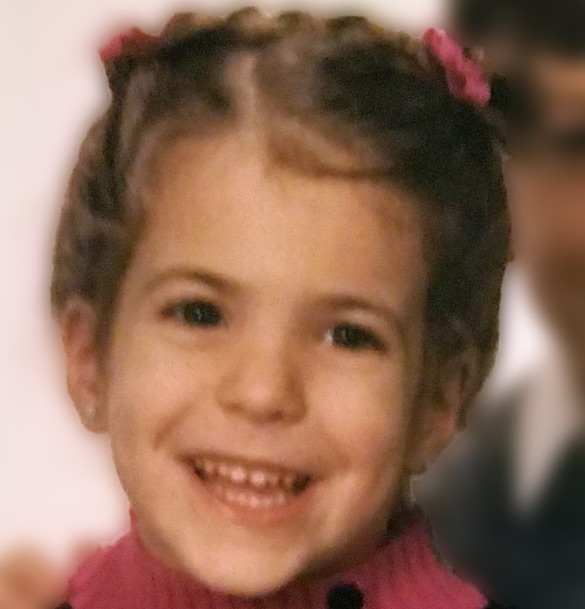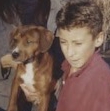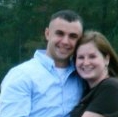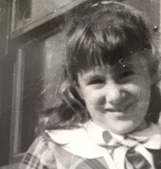A cold spring rain beats against my bedroom’s window panes. The cemetery walkways will be a slurry of ice and gravel. Nothing like the day twenty years ago when we buried my father – the crab apple blossoms like snow flurries, the chip-chip-chip of the sparrow, the smell of freshly-turned dirt.
I would have let pass this anniversary of my father’s death. He would have thought a memorial unnecessary, maybe even maudlin. But my mother has already made plans – a graveside reading, then luncheon at a nearby restaurant. We could reschedule it, or simply forgo the reading. But my mother will insist that we gather today, at his graveside.
I bend down to open my dresser drawer and pull out the cashmere scarf. I drape it around my shoulders and notice the crepey skin on my hands, the age spots on my forearms.
I turn back to the drawer. Under the faux pearls, the garish rhinestone earrings and the watches in need of repair, I come to the battered box stamped Genuine Diamond. I run my fingers lightly over the flocking. I open the box.
I’m six again. I’ve blown out all the candles on my birthday cake. The tendrils of smoke linger near my kitchen ceiling. My grandfather presses his lips to my forehead. He places this box, wrapped in silver foil and tied with a silky pink bow, on the table in front of me. I unwrap it slowly, reverentially, somehow sensing that’s what’s required.
Later that day, I will have opened and closed the box so many times that the hinge snaps. But initially, its springs open easily. Nestled in the satin folds is a tiny gold ring, with a silver heart and a diamond at its center.
I’ve never owned a ring before – other than what comes in the gumball machine outside the A&P. I slide it on my ring finger. I promise to never take it off. But a little later, standing with my father and grandfather on the platform, waiting for the train that will take my grandfather home, I forget this vow, slipping it on and off my little girl fingers.
I’m so enthralled that I don’t notice the one-eyed train moving towards the station. I don’t remember the sound the train made as it pulled in, but I know it must have been loud because it was an old-time train, part of the Baltimore & Ohio line – the B&O Railroad memorialized in Monopoly.
I don’t recall stepping over it, but there must have been a gap between the train and the platform. My father would have held my hand tightly, the tiny heart digging into his fingers, or mine, as we navigated the gap.
And I don’t recall the conductor of the train on the day that I turned six, though I imagine him squat, mustachioed, with a watch tucked into his vest pocket.
I have to conjure up all these things. But I remember the wicker train seat. It was an amber-colored high-backed bench, more suited for a porch than a train car. The weave was so tight that you could bounce the flat of your hand against it.
And the seat could move backwards or forwards so that you got to decide which direction you’d face as the train traversed the island.
Want to face ahead, to make it easier to catch a glimpse of what’s coming up – what’s new, perhaps unknown and yet untarnished – the next station, the next group of passengers to board? Then flip your seat forward.
Want to travel backwards, to see where you’ve been? To relish a long goodbye at the station, perhaps? Then flip the seat rearward.
I place my little girl hand on the top of the bench, feel how variable it is. I’m about to nudge it into motion when my father motions that I should sit. As I do, the seat snaps into a stationary position, facing forward.
We three settle into our seats, the train rattling along towards the Staten Island Ferry. I’m excited. I’ve never traveled on this train before. But for my grandfather, this has become a regular thing. Brooklyn to Manhattan on the subway, then the ferry to Staten Island, then the train south, down along the spine of the island to our house.
My grandfather used to drive to our house. He had a silver Plymouth Belvedere with chrome tail fins that reminded me of a fish. But last year, the doctor told him he shouldn’t drive anymore, on account of the Parkinson’s. His hands shake and sometimes he gets confused, especially at night. For the last few months, my father has been riding the train back with him after dinner.
None of us kids know it, but the worst lies ahead for my grandpa. For now, though, he still has the same, unselfconscious grin. He still plays the banjo and laughs at everything, even my brother’s knock-knock jokes.
Soon, he will begin to withdraw from us, and he will stare, unblinking, out of a face like a Halloween mask. One terrible day not long from now, my grandpa will fall asleep in his attic bedroom with his cigar lit, and be awoken by flames that dance in his bed covers and creep up the walls of the apartment. After that, he’ll go to live at the Holy Family Home. The hard case of his body will gradually obscure the person he was – butterfly returning to chrysalis.
But all of this lies in the future. This day, my father sits beside my grandpa, close enough that I can imagine their knees touching. My father’s black wavy hair is almost unruly, the muscles beneath his short sleeve knit shirt and polyester trousers still strong. They’re chuckling about some bit on The Three Stooges – maybe I’m just filling this in now, knowing that this was one of their favorites.
I sit on a two-seater next to them. It’s summer, and I’m wearing shorts or a dress, the wicker pinching my bare legs. But I don’t complain. After all, it’s my birthday and I’m riding the train – just me – my brothers haven’t been allowed to come along.
The sun is streaming through the window. I’m studying my ring in light and shadow, seeing how the passing trees make the gold and silver shimmer.
The ring is loose – too loose. I shouldn’t fault my grandpa – what could he have known about sizing a girl’s ring? His only daughter had died in childhood, of pneumonia or the croup – something she might have survived, had the family been able to afford a doctor.
This death, coupled with that of their infant son a year or two before, must have shaken something loose in my grandmother. This probably didn’t take much doing. She had been placed in foster care as a ten-year-old and sent downstate to live with a childless Italian couple. When she was sixteen, she was betrothed to my grandfather, who was almost thirty.
After their marriage, the couple moved in with my grandfather’s father, a man embittered by his own wife’s death decades before. The old man told his son that his new wife was no better than “borrowed blood” – useful only for making babies. He set out to teach his son – my grandfather – how to discipline his wife, with a strap or his fists, to keep her in line.
This is what my Aunt Carmela told me many years later. My grandmother was too wild, Aunt explained. Insolent and disrespectful.
Maybe she was. I don’t know. But I imagine her now, with her fiery red hair, though it was probably natural then, more like my own auburn. I can see the way it must have been for her, living in that cramped brownstone apartment, the memory of sickness and death lingering.
Not long after those deaths, my grandmother would steal away with my eight-year-old father in tow, boarding the New York Central Line early in the morning, praying that no one would miss them until they were far enough away.
But when my grandfather returned from the Navy Yard that afternoon and found his wife and only child gone, he must have known where to find them. Because the next day, my father was riding the Central Line back home, this time with his father. It was decades before he saw his mother again.
Sitting on the train with my grandpa and father that afternoon, though, I know none of this. I perch on my seat, putting the ring on this finger, then that. It’s a little big on my ring finger, but too small for my pointer. On my pinky, though, I can spin it almost full circle, so that the heart disappears and then reappears in nearly the same spot. I hold it up to the window and marvel at the tiny rainbow in the middle of the diamond heart.
Maybe I’m distracted by something outside; maybe I’m daydreaming – something my mother always said I did too much. But the next thing I know, my ring is gone.
I imagine I’m tentative in telling my father and grandfather – they are likely engrossed in some discussion about the old neighborhood in Brooklyn. But soon, we near the ferry terminal and I have no choice.
“Where did you drop it?”
There is a coldness in my father’s voice that I don’t think I’ve ever heard before. And when he turns to look at my grandfather, who sits silently, lips pressed close together, I know that I’ve done something bad, maybe even unforgivable.
“We’ll find it,” my father says to my grandfather, placing his hand on Grandpa’s arm.
Together, we search. I crawl on the floor, feeling the grit against my palms and knees. I rustle through crumpled-up newspapers, discarded coffee cups, torn train tickets. My father squats down in this row, then the next, scanning underneath the seats. My grandfather flips my seat backwards and forwards, flattening his hand and running his palm and fingers along the crease where the back joins the seat.
But the ring is gone. The long minutes pass. The train whistle blasts, signaling that the conductor will soon reverse direction.
“It’s gone,” my grandfather says, softly, with what I now recognize as resignation.
My father sighs, then holds out his hand to me. I am crying. Gently, he says, “Come. Let’s go. It’ll be all right.” Even now, if I close my eyes, I can feel the comfort of his warm, strong hand closing around my small, trembling one.
For a long time after, I looked for my ring on other girls’ fingers. When I didn’t find it, I told myself it didn’t matter. It was a baby’s ring. With its diamond chip, its only value was sentimental. There were other rings – the birthstone ring on my twelfth birthday, the double heart ring from my first boyfriend on my Sweet Sixteen, my college graduation ring. But the memory of that first ring remains, like a phantom limb.
On the day I lost my ring, my father had been looking forward – to his next raise, to his next promotion. Two years later, my father had his first heart attack, followed the next year by the “big one,” the heart attack that left him an invalid. In the instant that clot stopped blood flow to his heart, that part of his life was over. Like a train seat flipped from front to rear, he was suddenly looking backwards over what were the best years of his life.
I feel all of this as I hold the broken box, the faded-black velvet smooth against my palm.
For years, I kept the box because I hoped I’d find my ring again, or at least a replica. After all, it wasn’t such a special ring. My grandfather could never have afforded to buy something that was one-of-a-kind. So I searched. But the rings were never quite right. In time I came to understand that that ring, and that time, were lost.
Still, I kept the empty box, moving it from home to college, then grad school, to my first apartment, my first house, and to the place I call home now. All the way from then to now, it’s one of the few things that’s traveled with me every step of the way.
At first, I hated coming across that box. The regret would wash over me. I should have been more careful. I should have insisted that we look harder. I should have asked the conductor to hold the train. I should have left word with the Lost and Found. But I was only six.
In time, though, the box has become more precious to me than the ring. It reminds me of that one, inescapable truth. Not all losses can be overcome. Not everything can be made right. Some losses change the prism through which you see not only the light, but the shadows, too.
I had my first lesson in loss and acceptance on the day I lost that ring. In the years that have followed, I’ve had to submit to other losses, as I’ve gotten older and as people I’ve loved have moved in and out of my life. The best one can do is to try to accept these losses – to live with all the empty, broken boxes. Years from now, someone will find it and wonder why I didn’t just throw it out.
It’s almost time to leave for my father’s memorial. I close the box and feel the broken springs snap back into position. I run my fingers over the worn flocking one last time. Then, as gently as if I were putting a baby down for a nap, I place the box back into the drawer. I pull myself to standing. My knees creak, and it takes a moment to straighten up.
“Come,” I whisper to myself, remembering my father’s long ago words. “Let’s go. It’ll be all right.”
Suzanne Samuels’ essays and short stories have appeared in Snapdragon, Cyclamen and Swords, With Painted Words, Swimming World Magazine, Life in Ten Minutes, Red Eft Review and Mothers Always Write. She is currently at work on her first novel, The Orphans’ Wheel, set in New York City at the turn of the twentieth century. Suzanne lives in New Jersey with her husband, two teenagers, two dogs and two cats.
